I've been assigned to an overseas assignment, but will I be able to take my dog with me?
How will my child survive the plane? Where do I start preparing?"
Traveling abroad with your pet, a precious member of the family. At the same time as anticipation, you may feel uneasy when you consider the complexity of the preparations and the burden they may place on your pet. In particular, traveling by air is a stressful experience for pets, as they are placed in an environment that differs from their usual environment for a long time.
But,Please rest assured.The following is a list of the most common problems with theWith the right knowledge, careful preparation, and the support of trusted professionals, air travel with your dog or cat is not an insurmountable obstacle. Rather, being well equipped will make travel safer and more comfortable for both pets and their owners.
In this article, we at PetAirJPN, a company specializing in international pet transportation, comprehensively explain the steps, precautions, and contingency plans for safe travel by air with your pet, based on our extensive experience and the latest information. We provide concrete and practical information to relieve pet owners' anxieties and help them take the first step toward a new life with their beloved pets with peace of mind.This article will help you understand
Now, let's realize safe and comfortable air travel with your dog or cat together.
First thing to consider: is that flight really the best choice for your pet?
When planning a flight with your pet, the most important thing is to carefully determine if the trip is really necessary and safe for your pet.
Conformity assessment of individual pets
- Health Status: Health Status Pets with chronic disease (especially heart or respiratory disease), recent illness or injury, or pregnancy may be at increased risk. Be sure to have a thorough physical examination by a veterinarian prior to the visit.
- Age: 2 years old Extremely young (Approximate age: less than 4 months old) or older (e.g.Approx. 7 years of age or older) pets need to be more carefully evaluated because of their immature adaptability to environmental changes and thermoregulatory functions, as well as their low stress tolerance.
- Breed and cat breed characteristics (especially short-headed breeds):. Short-headed breeds (dogs with short noses) such as Bulldogs, French Bulldogs, Pugs, Pekinese, and Shih Tzus, as well as Persian cats and Himalayans, are at risk for respiratory problems and heat stroke due to their anatomyTends to be higher than other breeds of dogs and catsThis is considered to be the case. Many airlines have transportation restrictions (e.g., summer ban, year-round ban, etc.), so be sure to check with them.
 Miley.
Miley.Short-breed dogs and cats require special attention, but PetAirJPN can help you minimize the risk by using early morning and late night flights in cooler temperatures. Don't give up.Please contact us on our official line.The following is a list of the most common problems with the
- Personality Pets with extremely timid, nervous, or aggressive personalities may have difficulty adjusting to the stresses of transportation. Children with high separation anxiety should also be watched carefully.
The following article explains more about short-horned breeds.
Cases in which consultation with a veterinarian is essential
If you have any doubts about your pet's suitability for air travel other than those listed above, or if you would like to learn more about the risks specific to a particular condition or breed of dog or cat, please be sure to consult your veterinarian. Your veterinarian can provide medical advice on travel as well as check up on health conditions.
Risks associated with air travel and what to do about them
There are a few things to keep in mind when traveling by air with your pet. However,These can be well managed and mitigated with proper preparation and professional supportIt is.
Points to note that you should know
- Statistical Reality:. Data from the U.S. Department of Transportation and other sources indicate that the accident rate for animals transported by air is low, but rare cases have been reported. In particular, the risk is recognized to be higher for short-headed breeds than for other breeds.
- Cargo bay environment:. Although the cargo hold where pets are loaded is air-conditioned, the temperature and humidity may fluctuate during ground standby and in flight. They are also exposed to engine and mechanical noise and changes in atmospheric pressure (equivalent to an altitude of about 2000 m).
- Emergency:. The general rule is that in the event of an emergency evacuation, pets are treated like baggage or cargo and must be left in the cabin.
PetAirJPN's reliable support
We fully understand these precautions and offer transportation plans that place the safety and welfare of your pets as our top priority. Even if the travel is not for leisure purposes, but for unavoidable circumstances such as emigration,Thorough support for specific measures to minimize riskPlease rest assured that we will do everything we can to help you. If you have any concerns, please do not hesitate to contact ourPlease contact our experts through our official lineThe following is a list of the most common problems with the
Thorough Pre-Flight Preparation: To-Do List for Smooth Travel
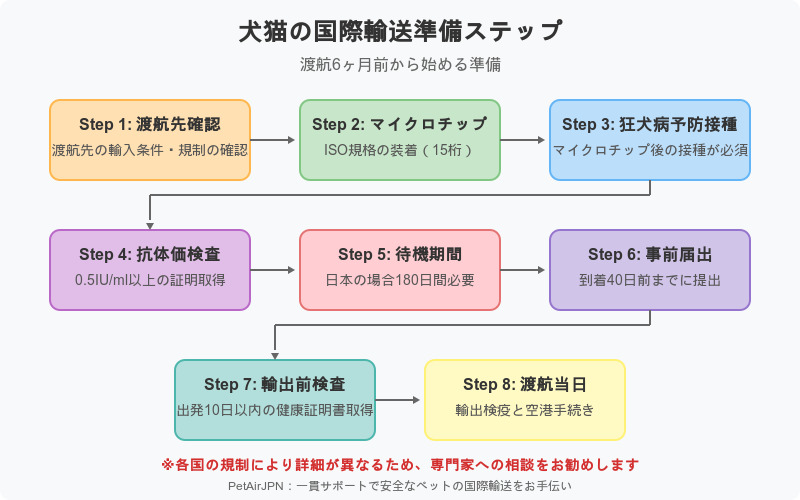
The key to successful air travel with pets lies in thorough advance preparation. Here is a step-by-step explanation of the preparation items that must be done before the flight.
Medical examination by a veterinarian and preparation of various documents
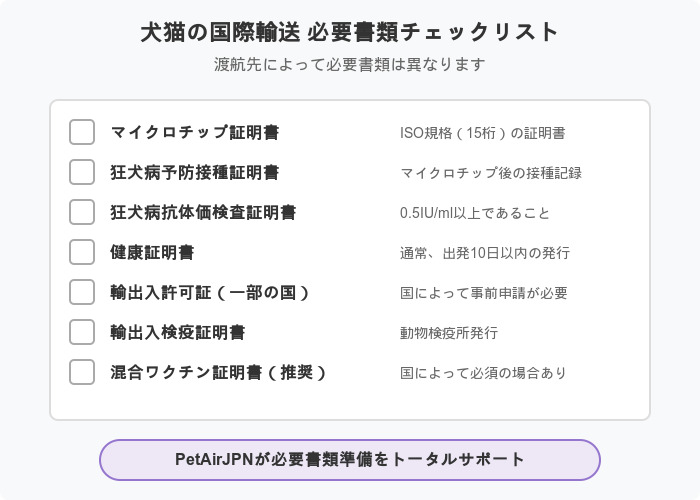
Most airlines and destination countries require a health certificate issued by a veterinarian (usually with a validity period of 10 days before departure), a certificate of rabies vaccination, and a certificate of mixed vaccination.
Particularly important points for international flights
- Microchip installed: (1) An ISO-standard microchip must be installed. Most countries require a rabies vaccination after installation.
- Rabies antibody titer test:. Required for entry into rabies-free countries such as Japan and for export to some countries. It takes several weeks from the time the blood is drawn to the time the results are known, and thenCases requiring a 180-day waiting period (e.g., upon entry into Japan)There are also someTravel planning should begin six months in advance, and in some cases even longer.
- Export/Import Permit / Prior Application:. Depending on the destination country, an import permit or advance notification may be required. You must also remember to apply to the Japanese animal quarantine office for an export permit (usually up to 7 days prior to departure).

Preparing documents for international transportation is really complicated, isn't it? PetAirJPN provides total support from listing to application on your behalf, based on the latest regulations of each country. If you don't know where to start, we can help you,Please feel free to contact me on the official line.Please contact us for more information. Detailed sales materials are also readily available.
The following article explains microchipping in detail.
▶︎ Required for your pet's international travel! A Thorough Guide to Microchipping Dogs and Cats
Rabies is explained in detail in the following article.
▶︎ The Basics of Rabies Vaccination You Need to Know: Traveling Safely Abroad with Your Pet
Complete understanding of airline regulations: He who controls the rules controls the trip.
Airline companies vary widely in terms of pet acceptance requirements, crate specifications, fees, and reservation procedures. Be sure to check the official website of the airline you will be flying with for the latest information.
PetAirJPN's advice:.
Airline regulations change frequently. Especially for international flights andDogs in the cabinPetAirJPN offers a wide range of services for your dog, depending on the type of dog and destination,Active support in researching and negotiating with airlines that allow in-flight accompanimentIf you have difficulty in confirming this by yourself, please contact us. If it is difficult to check by yourself,You can be sure to consult with our experts on the official lineFor more information, please contact us. Free online consultation is also available.
Choosing and preparing the right crate: an empty "home" for your pet
The crate is the most important item for the safety and comfort of your pet during transport.
- Compliance with IATA (International Air Transport Association) standards:. Many airlines require crates that comply with the IATA's animal transport regulations (LAR). (sturdy materials, adequate ventilation, secure locks, etc.)
- Appropriate size: 1.5" x 1.5" x 1.5" (1.5 x 1.5 cm) There should be enough space for the pet to stay in a natural position in the crate.(If you are traveling with your child in the cabin, be sure to check the size restrictions specified by the airline!)
- Preparation in crate:. Water absorbent rugs, nozzle-type water bottles, and various labeling options.

PetAirJPN will help you choose the best crate for your dog and customize it according to airline regulations,Especially consultation for carry-on baggageare also welcome.You can ask me anything on the official line!
The following article describes transport crates in more detail.
▶︎ [Definitive] Complete guide to choosing a crate to fly safely with your pet - PetAir JPN
Crate training: a secure "hiding place
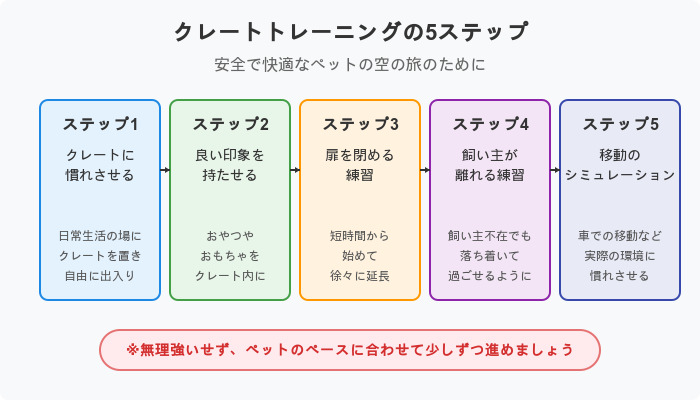
Pre-flight crate training is essential to ensure that your pet will be able to stay calm in the crate on the day of the flight. The goal is to make your pet realize that the crate is a safe and comfortable place for him or her.
Step 1: Get the child accustomed to the crate.
The crate is placed in the daily living area and allowed to come and go as it pleases.
Step 2: Make a good impression
Use treats and toys to create a good impression in the crate.
Step 3: Practice closing the door
Practice closing the door for short periods of time and gradually increase the time.
Step 4: Practice leaving the owner
We will help you stay calm when your owner leaves you.
Step 5: Simulation of movement
Simulate transportation, such as putting the animal in the car while it is in the crate.
If you have any questions about the procedure,Please feel free to ask questions on our official lineThe company is a member of the American Society of Mechanical Engineers (ASEM). Our experts will advise you.
Notes on Crate Training
- No use of the crate as punishment.
- Do not force. Proceed at your pet's pace without rushing.
- If they make a fuss, don't let them out right away, but praise them and let them out when they quiet down.

My son also had a hard time with crates, but PetAirJPNConsult on the official lineI asked him for help, and he was very kind and helpful in teaching me how to train! Thanks to them, I felt safe on the flight. I was especially grateful for the advice I received since I was aiming to bring my own carry-on!
Pre-flight meals, hydration, and exercise
- Meals:. Departure.Up to 2-4 hours beforeIt is common to finish a light, easily digestible meal on a A full stomach can cause motion sickness.
- Hydration: Hydration Ensure that fresh water is available until just before departure and a water bottle is placed in the crate.
- Exercise and Excretion:. Before heading to the airport, take a well-deserved walk and complete your elimination before check-in.
Minimize stress and anxiety
- Familiar:. A familiar blanket or towel with the owner's scent on it can be placed in the crate to provide a sense of security (choose one that does not pose a risk of accidental ingestion or entanglement).
- About Sedatives:. IATA and many veterinarians do not recommend the use of sedatives for pets when boarding airplanes.Sedatives carry the risk of side effects such as respiratory depression, decreased blood pressure, and decreased thermoregulation, which can be especially dangerous in airplanes with changing air pressure.Always consult your veterinarian and avoid use unless instructed otherwise.
PetAirJPN's Stance: Best Practices for Peace of Mind
As a rule, we do not recommend the use of sedatives, as the safety of your pet is our top priority. Rather, we recommend prior crate training, environmental considerations, andWays to radically reduce stress for pets, such as bringing dogs on board if possibleThe emphasis is on the Also on this point,Learn more from our experts on our official lineWe will be happy to discuss your needs with you.
Finally, the day of boarding: Airport procedures and in-flight precautions
After careful preparation, the day of departure is finally here. Let's take stock of the day's flow and precautions.
Check-in and security at the airport
- Early arrival:. If you are traveling with a pet, arrive at the airport with more time than usual. A good rule of thumb is to arrive 1.5 to 2 hours before departure for domestic flights and at least 3 hours before departure for international flights.
- Check-in: (1) At the airline counter, present the required documents and pay the pet transportation fee. Final confirmation of the crate will also be made.
- Security Checks:.(Procedures differ for domestic flights, international flights, and carry-on luggage. Please check in advance.)
Deposit and loading of pets
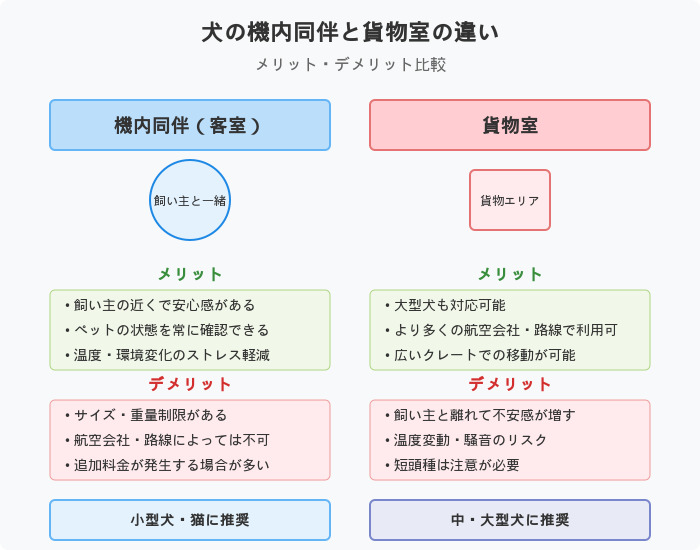
- For cargo hold deposit:. After check-in, pets are transported by airline staff to a dedicated waiting area before being loaded onto the aircraft. The airline makes every effort to ensure that pets are kept in an air-conditioned area and handled as carefully as possible.
- For carry-on dogs (recommended and supported by PetAirJPN!):
- Place in a soft carrier or crate of the designated size and store under the front seat.
- Although the pet cannot basically be taken out of its carry-on during the flight, it provides a great sense of security to be near its owner.
- Don't forget to be considerate of other passengers (squeals, smells, etc.).

For dogs, the safest place to be is in a guest room with their owners, and at PetAirJPN, we offer a variety of options,We provide full support from selecting flights that allow in-flight accompaniment to coordinating with the airline!Don't give up.Please consult with us.
Cargo compartment environment (reconfirmation)
In the case of cargo hold deposit, the environment of the cargo hold is different from that of the passenger cabin.Temperature and humidity control, changes in air pressure, noise, darknessIt is important to understand the circumstances in which your pet will be placed, such as By choosing a reliable airline and being well prepared in advance, you can expect to minimize the impact of these environmental factors on your pet.
If you have any concerns about the environment in the cargo hold or the care of your pet during the flight, please contact PetAirJPN'sPlease contact our official lineThe Our experts can provide detailed information and advice.
The following article provides more information on how to transport your pet.
After the flight: Safe arrival! Reunion and Aftercare
After a long flight, you arrive safely at your destination. However, the owner's role is not yet over.
Pet Pickup
- For cargo hold deposit:. It is usually handed over at a dedicated baggage claim counter or directly from an airline employee.
- For carry-on baggage:. After other passengers disembark, follow the crew's instructions to disembark.
- International Arrivals:. Procedures at the animal quarantine station are required. After checking the submitted documents and the pet's condition, if there are no problems, an import quarantine certificate will be issued and the pet will be allowed to enter Japan.

The quarantine after arrival for international flights, thanks to PetAirJPN's support, went really smoothly!I was given all the paperwork checks and process in advance on the official line.We were able to see each other again with peace of mind because we were Since we were accompanied in the plane, our child is full of energy!
Health check and care immediately upon arrival
- When you are reunited, first carefully observe your pet. Check for breathing, level of consciousness, and any injuries.
- Give them fresh water as soon as possible and let them defecate in a place where they can calm down.
- They may become ill from fatigue and stress from the long trip. After returning home, rest for a few days and carefully monitor the animal's appetite, energy, and defecation.If you notice anything unusual, consult your veterinarian immediately.
If you have any concerns about your pet's care after arrival, please contact PetAirJPN'sPlease contact us on our official lineWe can also provide information on local affiliated veterinary clinics if necessary. If necessary, we will also support you by providing information on local affiliated veterinary hospitals.
Important: Differences between domestic and international flights: Points to note especially for international flights
Procedures and regulations for pet transportation differ greatly between domestic and international flights.
| (data) item | Domestic Flights (Japan domestic travel) | International Flights (to/from overseas) |
|---|---|---|
| necessary documents | Only a consent form as specified by the airline. In many cases, health certificates are not required. | Health certificate designated by destination country/airline, vaccine certificate, microchip certificate, rabies antibody titer test certificate, import permit, and many others. These certificates must be written in English. |
| Quarantine and Procedures | Not required in principle. | Export quarantine at the Japanese animal quarantine station upon departure and import quarantine at the animal quarantine station of the destination country upon arrival are mandatory. Depending on the country, it may take several days to several months after arrival.Mooring quarantine (isolation)may be necessary. |
| Dogs in the cabin | Conditionally available on some airlines, supported by PetAirJPN. | Varies widely depending on airline and destination country.PetAirJPN provides thorough support for realization! |
| preparatory period | A few days to a few weeks. | At least six months in advance. In some cases, taking into account the waiting period for rabies antibody titer testing, it can take nearly a year. |
| cost | Relatively inexpensive (from several thousand yen). | Tends to be expensive (tens to hundreds of thousands of yen). In addition to airfare, documentation, inspection, quarantine agent fees, and in some cases, customs duties are required. |
| complexity | Relatively simple. | Very complicated. Since regulations differ from country to country and change frequently, it is essential to always check the latest information and follow the correct procedures. |
International transportation where PetAirJPN's expertise comes into play: especially strong support for dogs traveling in-cabin!
As you can see, pet transportation on international flights is far more complex than on domestic flights and requires specialized knowledge and experience. In particular,More detailed information and negotiation are required to bring your dog on board.This may be the case. Incomplete documentation or delays in processing can, in the worst case, result in the pet's denial of entry or prolonged detention.
Together, in any country, for all time."
This is our vision at PetAirJPN and we understand that this is the strong desire of our customers. We can help you to proceed reliably and safely with this complex international transportation process, especially in the realization of in-cabin flights for dogs, either on behalf of the owner or in a three-legged partnership with the owner. Our strength lies in our ability to provide a one-stop service, from gathering the latest country-specific regulatory information, assisting with complicated paperwork, negotiating with animal quarantine offices, arranging and negotiating with airlines, and providing on-the-ground support.
For more information on procedures and costs for international transportation, including in-cabin carriage of your dog, and specific sales materials, please contact PetAirJPN'sPlease feel free to contact us through our official lineWe are always available for free online consultations. Free online consultations are always available.
Be prepared for any problems: Be prepared for anything
No matter how well prepared you are, the possibility of unexpected problems is not zero. However, by being prepared in advance, you can respond calmly.
PetAirJPN's emergency response: peace of mind until the end
We are constantly monitoring the status of our clients' flights, including the status of their arrival destinations. In the unlikely event of flight delays or other problems, we are ready to respond quickly and appropriately in cooperation with our affiliated agents around the world. We put the safety of our customers and their pets first, and will support them responsibly until the very end.
What PetAirJPN can do for you: Total support for peace of mind (even bringing your dog on board!)
We, PetAirJPN, are a specialized agent for international pet transportation. We provide full support for your overseas travel with your pets with the following services.
For more information about these services or to make a proposal tailored to your individual case, please contact us!Please contact us through our official lineWe will provide you with the relevant information. Our professional staff will be happy to assist you and provide you with relevant materials.
PetAirJPN's Strengths: 1.
Summary: To take a new step forward with your beloved pet with peace of mind.
Flying with pets, especially international transportation, is certainly not easy. However, as this article has shown, each step is carefully prepared and the necessary measures are taken,With the support of trusted professionals, the bar is never too high.
Most important,
It is.
We, PetAirJPN, are "with you all the time, no matter what country you are in. Preferably in the cabin. We will do our best to support you and your precious family pet on your air travel by making full use of our expertise and experience, placing the safety, health, and stress reduction of your pets as our top priority.

PetAirJPN is a company that provides a wide range of services to help people who are looking for a place to live in Japan,Especially with dogs in the cabinWe will do our best to help you achieve your goals! No matter how small, we will start withContact us on our official line and we will be happy to assist you.Our experts will advise you right away, and it's easy to request information or schedule a free online consultation!

Yes! Together with PetAirJPN, we will open the door to a wonderful future with your beloved pet! We look forward to hearing from you.
Always check for the latest information.
Airline regulations and animal quarantine systems of each country are subject to change without notice. Please check with the relevant authorities or contact PetAirJPN for the latest information before planning your trip.You can also keep up to date with the latest information on our official lineIt is.
FAQ: Air Travel with Pets Frequently Asked Questions
What are your concerns?Our experts will talk to you in detail on the official line.We will advise you.
Additional frequently asked questions can be found in the following pages.
Also, information on pet-friendly airlines can be found here.
![Support for pets traveling and moving overseas|PetAir JPN [Official] for international transportation and quarantine procedures for dogs and cats Support for pets traveling and moving overseas|PetAir JPN [Official] for international transportation and quarantine procedures for dogs and cats](https://petair.jp/wp-content/uploads/2024/08/main_logo.png?1772221892)
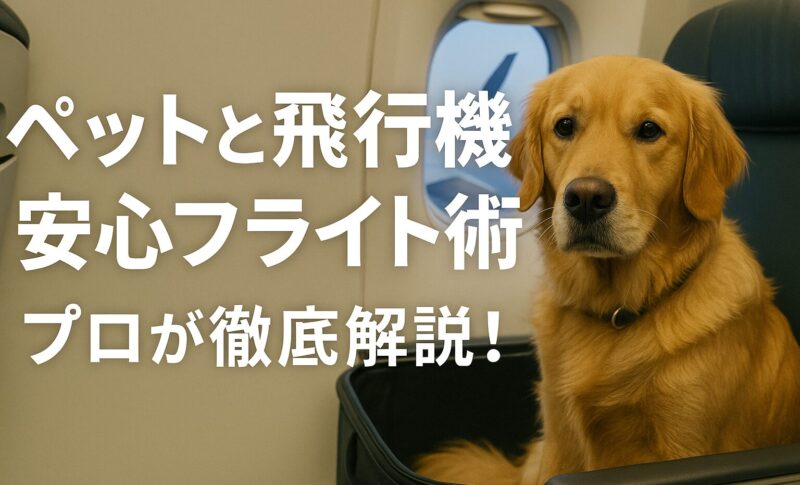



Comment